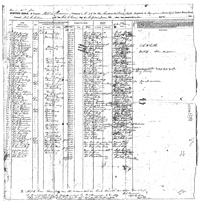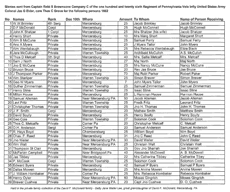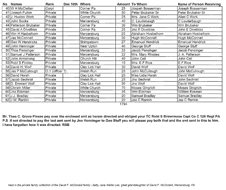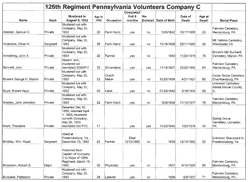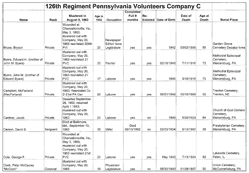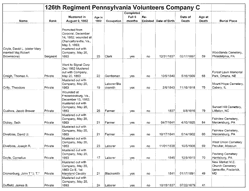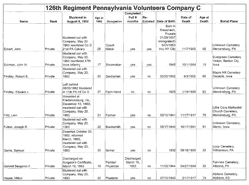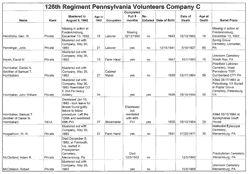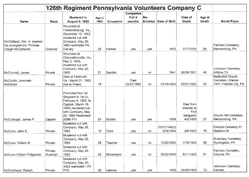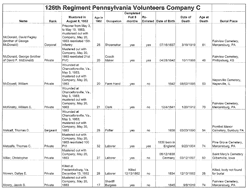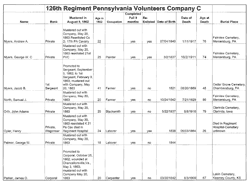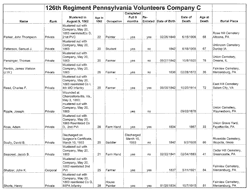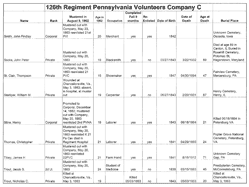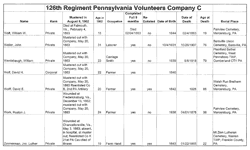Mercersburg's Volunteer Civil War Heroes 1862 -1863
By Margaret A. Lee-Williams
Genealogy is a passion of mine and I have spent many hours researching and documenting my ancestors; many who settled on the South Central Pe1msylvania/Maryland border in the late 1700's and early 1800's. These ancestors are my maternal family lineage. My great great grandfather David Fegley McDonald was born and raised in Mercersburg, PA. This too is the town where I spent my childhood.
It was only recently that in an old desk drawer my mother found a document dated December 10, 1862. She knew it belonged to her great grandfather and she knew that he was in the Civil War. There are familiar Mercersburg area last names listed on this document such as Shatzer, Myers, Metcalf, Stine, Alleman, Fritz, Metcalfe, St.Clair, Hornbaker, Byers, Pensinger, Divelbiss, Wolf, McCullough and McCulloh.
So with this document in hand I decided to research the role these listed men had in the Civil War. Mercersburg's people in 1862 were Union supporters and some were involved in the Underground Railroad. The Mercersburg residents knew that Mercersburg being located on the Maryland border was not safe from a possible rebel invasion. The people were very patriotic, supportive of the Union and desperately wanted to protect their town.
It was July 17, 1862 when President Abraham Lincoln called for volunteers to sign up to protect the Union for a nine month period. Approximately 100 men in Mercersburg answered the call.
Just three weeks from the time Lincoln called for volunteers approximately 100 men from the Mercersburg area left for Harrisburg, PA to begin their nine month patriotic duty.
My great great grandfather was a shoemaker by trade and had just celebrated his 25th birthday. He was married and had a one year old son. He and the other Volunteers had much in common. They were young, many were married with children and were tradesmen like him - painters, blacksmiths, coach makers, laborers and farmers - all leaving their families to support the Union.
August 7, 1862 was a typical hot and humid Pem1sylvania day when these men marched several miles from the Harrisburg train station through the streets of Harrisburg to the military camp, Camp Curtin, for formal enlistment in the Army of the Potomac as a Pennsylvania Volunteer Regiment. The Mercersburg group, along with other groups from Franklin, Fulton and Juniata counties, formed the 126th Regiment, Pem1sylvania Volunteers. Within a week, the 126th was one of the first Pennsylvania Volunteer Regiments to leave Harrisburg enroute to Washington DC.
The Regiment stayed encamped in the Arlington and Alexandria Virginia area, until September 14, 1862 when it was ordered along with thousands of other newly enlisted soldiers to march west from Washington DC through Frederick, MD, over South Mountain to the town of Sharpsburg, MD. There on September 18, 1862, after marching 24 miles from Frederick at full speed for 16 hours, the exhausted regiment witnessed the aftermath and massacre of the battle at Antietam.
The Battle of Antietam is well documented in both written and photographic observation. And, it was with great emotion when I learned that my great great grandfather, a corporal in the 126th Regiment witnessed the aftermath and horrors of war; seeing the rows of dead, wounded and dying. It was also another emotional genealogical finding for me to discover that my other great great grandfather, Otho Nesbitt as a concerned citizen also witnessed the afte1math of this battle on the same day and at the same place. Otho Nesbitt lived in Clear Spring, MD and had ridden his horse 20 miles to view the battle's aftermath. Otho kept a daily diary which remains a family treasure. His written observation of his experience has been cited by Civil War historians who have written about the battle. Otho wrote, "Went on the battlefield again and was pe1mitted to go where I pleased. The Union men were nearly all buried: the army in motion. Two columns appeared to go towards the river about a mile apart and the balance went down the Sharpsburg Pike. I rode on to the battle field where the Rebels formed their line of battle. They were not buried. I could see their line distinctly by the dead lying along it as they fell. Nearly all lying on their backs as if they hadn't even made a struggle. The line I suppose was a mile long or more."
As far as I know, neither a diary nor a letter written by my great great grandfather McDonald survived. But through research I located a historical regiment sketch, newspaper chronicles, letters and diaries written by other soldiers in the 126th Regiment. It is through these writings that I was able to piece together the nine month movement of this regiment and to understand the emotions of these men during their nine month volunteer enlistment.
The 126th Regiment stayed in the Sharpsburg area for over a month after its September 18th arrival. During that time they were reviewed by President Lincoln when he visited the area on October 3, 1862. It was also during this time that the Regiment experienced its first gun fire while on reconnaissance near Leetown, WV. On October 16, 1862, they moved across the Potomac River from Sharpsburg to Shepherdstown, WV and on to Leetown. There in Leetown, according to Private Seth Dickey, the men found some of the army overcoats captured by General J.E.B Stuart during his raid, days earlier, in Chambersburg, PA. Upon the Regiment’s return to Sharpsburg, two days later, the Regiment was presented with its official regimental flag.
On October 30, 1862, the regiment began a 122 mile march from Sharpsburg, MD to Fredericksburg, Va. They traveled through Virginia's Loudon and Fauquier counties arriving 10 days later near Warrenton, VA. George Welsh, a soldier from Waynesboro, writes to his sister describing the events of November 11, 1862. "We were ordered to turn out for review and it was stated that General McClellan had been relieved of his command and would then take leave of the army. It was a most splendid sight. Our whole division was drawn up near the road and facing it. Away off and to the right the cam1on commenced booming, and cheer after cheer from thousands am1ounced the Commander's coming. h1 a short time he made his appearance with his Staff and Corps Commanders. The music struck up, the men presented arms, and George B. McClellan took leave of an army which loved him and which sadly saw his departure. As to army movements we are left entirely in the dark-since McClellan's departure there has no doubt been some change in the plan of the campaign if any plan has been adopted as yet."
By November 20th the men had traveled through knee deep mud and encamped in Falmouth, VA just across the river from Fredericksburg which was under control of the Confederate Anny. It was not until December 10, 1862, 4 months into their volunteer enlistment that the men received their first pay. With the rumors that they were about to move into Fredericksburg to fight the Rebels, the men received their pay but many chose to send most of their pay home to loved ones in Mercersburg.
In my research I discovered a letter owned by the Allison Antrim Museum, written by Samuel North, a private in the 126th also from Mercersburg. North wrote to his father telling him that he had received his pay and that he was sending $25 home. Here in this letter I found the explanation for the document dated December 10, 1862 found almost 150 years later in my mother's desk drawer. This document lists the names of 62 soldiers from Mercersburg, including Samuel North and David McDonald, wanting to send money home, how much money was to be sent, and who was to receive it. The last column on the document contains the signature of the person receiving the money. (A copy of this document and a transcription is attached to this newsletter.)
As a great great granddaughter, I not only wanted to trace my great great grandfather's Civil War footsteps, but I was interested in knowing what he and the others in his Regiment were experiencing and thinking. The Battle of Fredericksburg left the men with difficult images and nightmares. This battle, like Antietam, was a massacre leaving thousands dead and this was the Regiment's first battle experience. This Regiment was the last Union unit ordered to charge the Rebels behind the Sunken Road wall and in order to do so, they charged having to step on and over prior Regiments who were fallen dead or injured or were lying in wait. It was a horrific experience for these men and this battle left the men feeling that they may not survive to make it to their May 1863 discharge.
In a December 18, 1862 letter to his brother, Samuel North wrote, "I have heard of the horrors of the battle field but the reality is terrible. In the action and excitement it is not realized but the thoughts and impressions seem to be burned on my brain. The still pale faces of the dead and the shrieks and groans of the wounded and dying. Oh! It is awful. I think our loss must be very severe. I saw a great many dead men we could hardly step without tramping on them."
In a letter written December 21, 1862 by the Regiment's surgeon to his wife, Surgeon Washington George Nugent writes, "it was a dreary midnight ride through our Camp. I have no language to tell how desolate they look, animals as well as men." Surgeon Nugent’s letters have been compiled by his great granddaughter Maria Randall Allen in a book entitled, My Darling Wife.
My research also led me to a diary owned by Gettysburg College. It is the Diary of Benjamin Dawney from Fannettsburg, PA who was a private in the 126th Regiment. He purchased the diary on December 10, 1862 with the money he received from his first pay. In his diary, he writes, "Dec 25. Christmas....Stern reflections on that day of the past and future. Thought-what might happen till next Christmas. I might die and am I ready? Helped dig grave."
The winter months proved to be challenging. The weather was often cold, wet and snowy. The men's living quarters were a dug out rectangular shaped pit, surrounded by logs, covered by a tent with a chimney for heat. On January 20, 1863 the men were ordered to march out of camp in an attempt to move toward Richmond, VA. The weather proved to be too much. The cold rainy weather turned the roads to mud, preventing further movement. This aborted march, now known as the famous Mud March of January 1863, tried the patience of the soldiers. Samuel North wrote in a letter to his brother, "the men had been three days in the rain and mud and weary wet tired and stiff in all our bones. We worked on but by this time the impracticality of winters campaigning had been fully demonstrated."
From February to April 1863, the Regiment remained encamped at Camp Humphries- named for the Regiment's Brigadier General Andrew Humphries. The camp was located near Falmouth, VA, across the river from Fredericksburg. The men were assigned to picket duty guarding the camp's perimeter three days at a time. During the winter months they would return from picket duty sick and tired often ending up in the Regiment's hospital.
Just 10 days from the Regiment's scheduled May 9, 1863 discharge, the Union army again received orders to move. The Regiment again, along with thousands of other soldiers, moved toward the rebel army lines and became engaged in a battle now known as Chancellorsville. There in the woods and the thicket both armies battled through another horrific scene. David Fegley McDonald was one of ten soldiers in his regiment taken prisoner. Lieutenant Clay McCauley, also one of the ten taken prisoner, described his experience in this battle years later as "a most trying experience" which he "was sure that each next moment would bring death." Having survived the battle and days imprisonment, these men were exchanged for Rebel prisoners held by the Union and returned to the Army of the Potomac. The men of the 126th Regiment were mustered out of service on May 20, 1863.
Most of the Mercersburg men returned home to Mercersburg at the end of May 1863 and my great great grandfather, like 31 others in his company from Mercersburg later reenlisted. He reenlisted in April 1864 and served an additional three years being honorably discharged as a Sergeant.
Even though these men lived through 9 months of war experiencing three bloody battles, and many then serving a second enlistment, they never lost love for their country. Upon my great great grandfather's death in 1919 at 81 years of age having spent the last 19 years of his life in a wheelchair as a result of a stroke, his obituary revealed his patriotism and loyalty stating, "That he was a soldier in all the implication of the word is evidenced by the history of his army career and the bravery and fortitude with which he bore his 19 years of afflictions. He displayed the same heroic spirit of bravery, fortitude and patience as he did when facing the enemies of his beloved Union. When the Crisis of Civil war confronted the nation under the administration of Abraham Lincoln he enlisted on the side of the Union and throughout the struggle proved a loyal and brave soldier."
My great great grandfather's experiences were shared by these heroic men of the 126th. The following pages list the names of Mercersburg's Volunteer Civil War heroes who left their families and volunteered for service in August 1862. One third of these men, reenlisted after their initial 9 month service. After the Civil War, 26 men moved to the Mid-West establishing families in Iowa, Illinois, Nebraska, Kansas and Texas. Almost half of these men lived to be over the age of 65. Today, 20 of these men rest in Mercersburg's Fairview Cemetery and another 19 rest in other Mercersburg area cemeteries.
Rest in peace Mercersburg's Civil War Heroes. Let us honor their contributions to our country’s history as we commemorate the Civil War's Sesquicentennial.
Click on Images to Enlarge
126th Pennsylvania Infantry Regiment - References
Alexander, Ted. The 126th Pennsylvania.
Bates, Samuel P. History of the Pennsylvania Volunteers, 1861-5.
Dawney, Benjamin, Diary December 1862-May 1863, Gettysburg College
Dickey, Seth, Roster of Company C, 126th PV Infantry, August 3, 1915
MacCauley, Clay. From Chancellorsville to Libby Prison
MacCauley, Clay. Through Chancellorsville, Into and Out of Libby Prison.
North, Samuel W. -Letters Aug 20, 1862-May 20, 1863, Allison Antrim Museum, Greencastle, PA
Nugent, Washington G. "My Darling Wife ... ": The Letters of..., Surgeon, Almy ofthe Potomac.
Rowe, David W. A Sketch of the 126th Regiment Pennsylvania Volunteers
Sauers, Richard A. Advance the Colors!: Pennsylvania Civil War Battle Flags Vol. 2.
The Women's Club of Mercersburg, Old Mercersburg.
Welsh, George and Philip, Civil War Letters From Two Brothers, Yale Review
University of Virginia, Valley of the Shadow http://valley.lib.virginia.edu/
National Archives and Records Administration (NARA); Washington, D.C
United Status Census 1850, 1860, 1870, 1880, 1900, 1910
1890 Veterans Schedule,
U.S. Civil War Draft Registration Records 1863-1865
Back to Civil War
